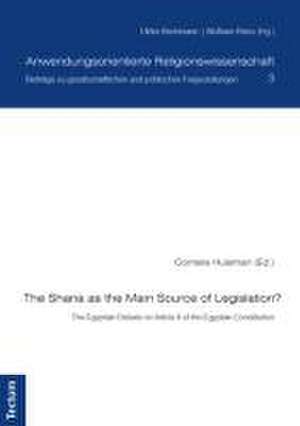The Sharia as the Main Source of Legislation?: Anwendungsorientierte Religionswissenschaft, cartea 3
Editat de Cornelis Hulsmanen Limba Engleză Paperback – 30 noi 2012
Preț: 166.58 lei
Nou
Puncte Express: 250
Preț estimativ în valută:
31.87€ • 33.28$ • 26.32£
31.87€ • 33.28$ • 26.32£
Carte indisponibilă temporar
Doresc să fiu notificat când acest titlu va fi disponibil:
Se trimite...
Preluare comenzi: 021 569.72.76
Specificații
ISBN-13: 9783828830677
ISBN-10: 3828830676
Pagini: 260
Dimensiuni: 149 x 213 x 25 mm
Greutate: 0.39 kg
Editura: Tectum Verlag
Seria Anwendungsorientierte Religionswissenschaft
ISBN-10: 3828830676
Pagini: 260
Dimensiuni: 149 x 213 x 25 mm
Greutate: 0.39 kg
Editura: Tectum Verlag
Seria Anwendungsorientierte Religionswissenschaft
Notă biografică
Cornelis
Hulsman
has
an
MA
in
Development
Sociology,
Leiden
University
(1984).
Held
leading
functions
in
Dutch
emigration
service,
1986-1994.
Living
in
Egypt
since
1994.
With
his
Egyptian
wife
Sawsan
Gabra
Ayoub
Khalil
founder
of
Arab-West
Report
and
the
Center
for
Intercultural
Dialogue
and
Translation.
Author
of
several
investigative
reports
on
Muslim-Christian
tensions
in
Egypt.
Cuprins
PrefaceIntroduction
(Cornelis
Hulsman)
1
Discussions
on
Article
II
of
the
Constitution
in
Egypt
need
a
calm
approach
(Hani
Labib)
2
Opinion
poll
on
canceling
or
keeping
Article
II
of
the
Egyptian
Constitution
(Fatma
El-Zanaty
and
Muhammad
al-Ghazali)
2.1
The
objectives
of
the
opinion
poll2.2
Organization
of
the
Report2.3
The
Survey
Methodology
and
Sample
Design2.4
Survey
Coverage2.5
Characteristics
of
the
Sample2.6
Opinions
of
Citizens
about
the
Constitution2.6.1
Knowledge
about
the
Egyptian
Constitution2.6.2
Positions
Regarding
Participation
in
the
Referendum
on
the
Constitutional
amendments
of
March
192.6.3
Opinion
Trends
Towards
Constitutional
Amendments
on
March
192.6.4
Trends
Regarding
Whether
Priority
Should
be
Given
to
Changing
the
Constitution
first
or
first
the
People's
Assembly
Elections2.7
Opinions
of
Citizens
about
Article
II
of
the
Constitution
2.7.1
Knowledge
about
Article
II
of
the
Constitution2.7.2
Hearing
about
Proposed
Amendments
of
Article
II
of
the
Constitution2.7.3
Reasons
Believed
to
be
Behind
Proposal
of
Amending
Article
II
of
the
Constitution2.8
Tendencies
towards
Article
II
of
the
Constitution2.8.1
Tendency
to
Keep
Article
II
of
the
Constitution2.8.2
Tendency
to
Annul
Article
II
of
the
Constitution2.8.3
Tendency
to
Amend
Article
II
of
the
Constitution2.9
Conclusions
Opinion
Poll2.9.1
Summary
of
the
Most
Important
Results
and
Recommendations3
Comparing
Muslim
and
Christian
responses
in
the
El-Zanaty
Survey
(Jayson
Casper)
4
Article
II
of
the
Constitution:
Amendment
for
Time
(Usamah
Salamah)
5
Roundtable
discussions
about
Article
II:
Clerics,
Media,
and
Civil
Society
(Jayson
Casper)
6
Example
of
misrepresentation
of
Article
II
in
relation
to
Christians
in
Egypt
(Cornelis
Hulsman)
6.1
Introduction6.2
Social
Context;
Secularism,
Cultural
Relativism
and
Differences
in
Development6.3
The
Place
of
Christians
in
Modern
Egypt6.4
Egyptian
Curricula6.5
Media6.6
Arbitrary,
Politically-motivated
Application
of
the
Law6.7
Is
the
shari'ah
Inherently
Discriminatory
towards
non-Muslims?
6.8
Changes
in
social
perceptions
in
society6.9
Conclusion7
Article
II
of
the
Egyptian
Constitution;
background
and
contrasting
opinions
(Patricia
Prentice)
7.1
Introduction7.2
Traditional
Methods
of
Interpreting
the
shari'ah7.3
Development
towards
Article
II
of
the
Constitution7.4
How
Article
II
is
interpreted
by
the
Supreme
Constitutional
Council7.5
The
contrasting
opinions
on
Article
II
of
the
Constitution7.6
Conclusion8
Article
II
in
the
Debate
about
Constitutional
Amendments
in
2007
(Nushin
Atmaca)
8.1
Introduction8.2
Article
II
in
the
Discussion
before
the
Constitutional
Amendments8.3
Article
II
and
the
Constitutional
Amendments8.3.1
Why
Article
II?
8.3.2
Groups
and
arguments8.4
Conclusion9
Nabil
Ahmad
Hilmi:
A
liberal
scholar
advocating
amending
Article
II
(Cornelis
Hulsman)
9.1
Conflicting
Cultures
and
the
Overwhelming
Islamist
Majority9.2
Liberals
and
secularists
in
past
lawmaking9.3
The
Supreme
Constitutional
Court9.4
Article
II
in
the
1971
Constitution
and
the
1980
Amendment9.5
Arguments
about
the
relation
between
the
shari'ah
and
the
law9.6
Comparisons
to
other
countries9.7
Arguments
by
opponents
of
Article
II
of
the
Constitution9.8
Article
II
and
its
Impact
on
Copts9.9
Response
to
Unfairly
Blaming
Article
II9.10
Conclusion10
Article
II
and
Freedom
of
Belief
(Hani
Labib)
10.1
History10.2
The
2007
Constitutional
Amendments10.2.1
Article
I
and
II10.2.2
Examples
of
Sectarian
Arguments
around
Article
II10.3
Conversions
to
Islam
and
Christianity10.3.1
Rulings
and
Evidence10.3.2
Constitutional
provisions
related
to
equality
and
freedom10.3.3
Religious-change
Law10.4
Proposed
Texts
for
Drafting
Article
II10.5
Conclusion
with
proposed
text
for
the
amendment
of
Article
IIAbout
the
Center
for
Intercultural
Dialogue
and
Translation
(CIDT)
About
the
Authors

